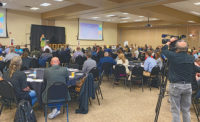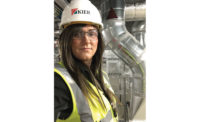In 2004, as a 16-year veteran in the mental health field, clinical psychologist Sally Spencer-Thomas thought she knew a lot about how the mind works. The perception shattered when her brother died by suicide that year. It propelled her on a new career track to prevent others from experiencing what her brother had.
Digging through statistics, she saw “that it was working-age men that were dying by suicide, making up the biggest numbers, and the workplace was doing nothing about it.” This led her to work with nonprofits and as a consultant to provide training and resources to prevent suicide in male-dominated industries. Today, her primary focus is the construction industry, where up to five times more workers die by suicide than from jobsite accidents.
Related Article:
Safety Advocates See Strength in Numbers to Combat Suicide and Substance Misuse
Back to:
25 Top Newsmakers
Her “personal story of the loss of her brother humanizes the topic of mental health and suicide prevention,” says Chun Yee Yip, director of social impact at Lendlease. “Her message on how prevalent suicide is in people’s lives enables her to train from an authentic place.”
Working with non-profits Johnson Depression Center and United Suicide Survivors International, of which she is president, Spencer-Thomas spent much of the past year developing and piloting Construction Working Minds, a mental health training program geared to the jobsite. Through industry partnerships with Lendlease, Hensel Phelps, Rosendin Foundation, the SMART union, the Construction Industry Alliance for Suicide Prevention and others, the effort has trained more than 1,400 people to “build a network of mental health champions in the construction industry,” says Yip.
Participants learn “valuable information about the suicide risk model, warning signs and how to help someone in crisis,” says Mike Choutka, Hensel Phelps president and CEO. “Most importantly, this training has helped normalize conversations about mental health and educate participants about resources that are available.”
Game-Changer
Spencer-Thomas sees 2021 as a game-changer, with larger firms and unions investing more in mental well-being. During the pandemic, “people started to have conversations about mental health in ways they never did before, and employers started to realize that mental health is part of overall health, and psychological safety is part of overall safety,” she says.
Psychological safety tools that larger firms and groups now are developing will soon become available to “mom and pop” shops and smaller trade partners, she says, making their investment less burdensome. Spencer-Thomas also predicts it will become common for suicide prevention and mental health promotion to be “baked into” safety training courses.
“She is a bold visionary entrepreneur who understands progress can’t be made without taking risks and building strong teams,” says Cal Beyer, vice president of workforce risk and worker well-being at Holmes Murphy & Associates, a 2016 ENR Newsmaker for boosting suicide prevention awareness. “She is tireless and plows through barriers. Through passion, skill and collaboration she makes major mind shifts and change efforts seem easy.”





Post a comment to this article
Report Abusive Comment